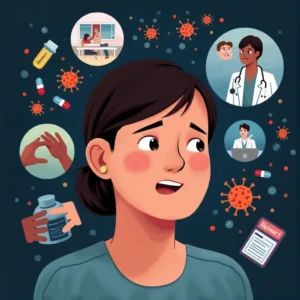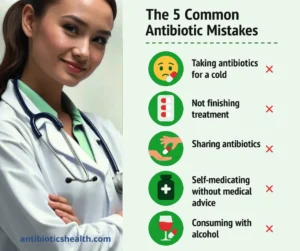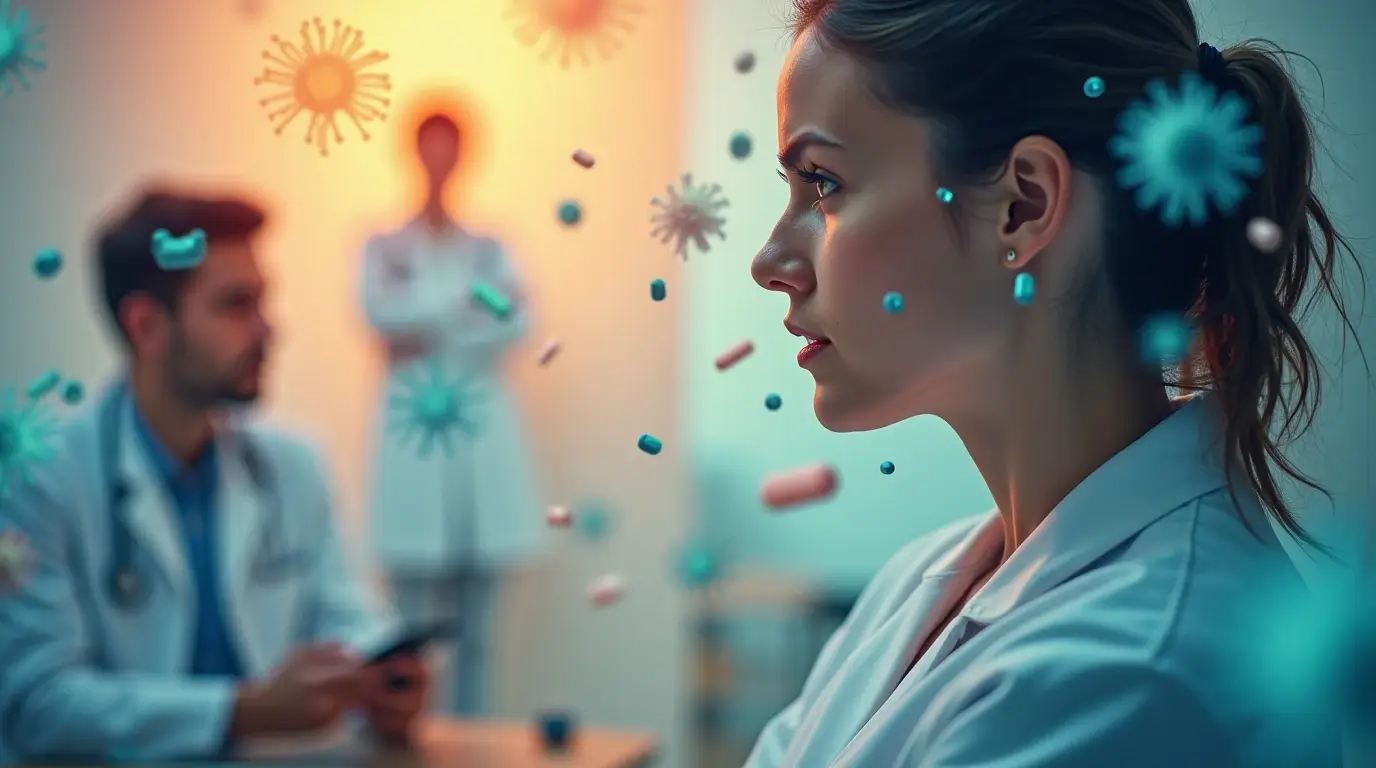I learned a hard lesson about antibiotics during a tough health time. A simple infection turned into a big medical issue. It taught me how important it is to use these medicines right.
Antibiotics are key in fighting bacterial infections. But, many people make mistakes with them. These errors can harm their health and help antibiotic resistance grow.
In this guide, we’ll look at the biggest mistakes people make with antibiotics. Knowing these can help keep you healthy and support better medical care.
Key Takeaways
- Antibiotics are effective only against bacterial infections
- Completing the full prescription is crucial
- Self-medication can be dangerous
- Proper storage matters for medication effectiveness
- Always consult healthcare professionals about antibiotic use
Understanding Why Proper Antibiotic Use Matters

Antibiotics are key in modern medicine, but they only work if used right. Using them wrong can cause big health problems that affect more than just one person.
Bacterial infections are a big threat to our health. Antibiotics target bacteria, killing or stopping their growth. They can’t fight viral infections like colds or flu.
The Critical Function of Antibiotics
Antibiotics protect us from harmful bacteria. They work in several ways:
- Disrupting bacterial cell wall formation
- Blocking protein synthesis
- Interfering with bacterial DNA replication
The Dangerous Path of Antibiotic Resistance
Antibiotic resistance happens when bacteria learn to survive the drugs meant to kill them. Using antibiotics too much or when not needed makes this problem worse. Bacteria can quickly change, making them hard to treat.
Global Health Implications
Using antibiotics wrong affects us all, not just one person. It leads to a global health crisis where infections that used to be treatable can now be deadly.
One misused antibiotic can contribute to broader resistance patterns that impact entire communities.
Doctors and patients must team up to stop antibiotic-resistant bacteria. Using antibiotics wisely is our best defense against losing effective treatments.
The Most Common Mistakes With Antibiotics
Antibiotics are powerful drugs that can save lives. But, many people use them wrong, risking their health. Knowing the common mistakes can help avoid these dangers.


Using antibiotics right is key. Self-medication risks are high when people don’t understand how they work. Let’s look at the most common errors that can harm your health and treatment.
- Taking antibiotics for viral infections
- Stopping treatment before completing the full course
- Self-medicating with leftover prescriptions
- Mixing antibiotics with alcohol
- Improper storage of medication
Each mistake can cause serious problems. Antibiotic resistance is a big health issue caused by misuse. Patients who don’t follow doctor’s orders may make this problem worse.
“Antibiotics are not a one-size-fits-all solution. Each prescription requires careful, informed use.” – CDC Health Guidance
Knowing these mistakes is the first step to using antibiotics wisely. In the next parts, we’ll go into each error. We’ll give expert advice to keep you healthy and fight antibiotic resistance.
Taking Antibiotics for Viral Infections
It’s important to know the difference between viral and bacterial infections. Many people take antibiotics for colds or the flu by mistake. This can lead to health risks and wrong treatment.
Viral infections are different from bacterial ones. Your body usually fights viruses on its own. Antibiotics are made to kill bacteria, not viruses.
Why Antibiotics Don’t Work Against Colds and Flu
Antibiotics can’t fight viral infections because they target bacteria. Viruses take over your cells and can’t be killed by antibiotics. Taking antibiotics for colds or flu can harm your body’s defenses.
- Viruses replicate inside human cells
- Antibiotics cannot penetrate virus-infected cells
- Viral infections typically resolve on their own
Identifying Bacterial vs. Viral Infections
Telling bacterial from viral infections can be hard. Look for these signs:
- Duration of symptoms
- Presence of fever
- Specific symptom patterns
When to Ask Your Doctor About Antibiotics
If symptoms don’t get better or get worse, see a doctor. They can check if you need antibiotics and make sure you get the right treatment.
Always seek professional medical advice for accurate diagnosis and treatment.
Self-Medicating With Leftover Prescriptions
Many people unknowingly self-medicate with leftover antibiotics. They keep unused antibiotics from past prescriptions, thinking it saves money or time. But, this practice is risky and can cause serious health issues.
Using or sharing antibiotics without a doctor’s order can lead to several problems:
- Reduced effectiveness of future treatments
- Potential development of antibiotic-resistant bacteria
- Unexpected allergic reactions
- Incorrect dosage for current medical conditions
Doctors strongly advise against using leftover antibiotics. Each prescription is made for a specific infection and patient. What worked for a previous illness may not be right for a current health issue. Antibiotics don’t fit all infections.
“Always consult a healthcare professional before taking any antibiotics,” recommends the Centers for Disease Control and Prevention.
Expired or stored improperly, antibiotics lose their strength. Taking outdated medication can lead to ineffective treatment. Bacteria can also become resistant, making future infections harder to treat.
The best way is to:
- Dispose of leftover antibiotics properly
- Consult a healthcare provider for new prescriptions
- Never share prescription medications
- Follow medical guidance precisely
Keeping your health safe means making smart choices about medication. Always ask for professional advice instead of using leftover prescriptions.
Not Completing the Full Course of Treatment
Stopping antibiotics too soon is a big mistake. Many think they’re done when they start feeling better. This can lead to serious health risks and antibiotic resistance.
Not finishing treatment is bad for your health. Bacteria can survive and get stronger. This makes future infections harder to treat.
Why Early Discontinuation Promotes Resistance
Stopping antibiotics early can cause problems. Surviving bacteria can:
- Mutate and become more resilient
- Develop stronger defense mechanisms
- Spread potentially drug-resistant strains
Creating an Effective Medication Schedule
To finish treatment, try these tips:
- Set daily reminders on your phone
- Use a medication tracking app
- Place pills in visible locations
- Keep a written medication log
Managing Treatment Side Effects
If side effects are tough, talk to your doctor. They can suggest other options or help you deal with discomfort without stopping treatment.
Always complete your full antibiotic prescription, even if you feel better midway through treatment.
Mixing Antibiotics With Alcohol
Drug interactions can be very dangerous, especially when you mix antibiotics with alcohol. Many people don’t realize how risky it is to drink alcohol while taking medicine.
Alcohol can change how antibiotics work in your body. This mix can cause serious problems:
- Reduced effectiveness of the antibiotic
- Increased risk of side effects
- Potential liver damage
- Compromised immune system response
Some antibiotics have especially bad reactions with alcohol. Metronidazole and tinidazole can cause heart problems, stomach pain, and flushing when mixed with alcohol.
Doctors always advise against drinking alcohol while taking antibiotics. The risks are too high. Your body needs to focus on fighting infections and healing.
“Alcohol can interfere with your recovery and potentially make your infection worse.” – Medical Professionals
To use medications safely, follow these tips:
- Always talk to your doctor about drinking
- Read your medication labels well
- Wait 48-72 hours after finishing antibiotics before drinking
- Stay hydrated and help your body heal
Keeping your health safe means making smart choices about antibiotics and alcohol. If unsure, always choose your health and get medical advice.
Improper Storage and Expiration Concerns
Storing antibiotics right is key to keeping them working well and keeping you safe. Misusing antibiotics starts with how you store them. Knowing the best storage can stop health problems and keep the medicine strong.
Keeping Antibiotics Safe and Effective
Wrong dosage and storage can hurt an antibiotic’s fight against infections. Most antibiotics need special storage to stay good:
- Store in a cool, dry place away from direct sunlight
- Keep medications in their original labeled containers
- Avoid storing in bathrooms or areas with high humidity
- Keep out of reach of children and pets
Decoding Antibiotic Expiration Dates
Expiration dates are not just suggestions. Expired antibiotics can lose their effectiveness or become potentially harmful. Here’s what you need to know:
- Check the printed expiration date on the medication package
- Never use antibiotics past their expiration date
- Dispose of expired medications properly through pharmacy take-back programs
Remember: Antibiotics are powerful medications that require careful handling and storage.
If you’re unsure about your antibiotic’s storage or have questions about its effectiveness, always consult your healthcare provider. Proper storage and understanding expiration dates are key to preventing antibiotic misuse and ensuring the best possible treatment outcome.
Prevention and Natural Alternatives
Preventing antibiotic resistance starts with smart lifestyle choices. These choices boost your immune system. It’s important to make health and wellness a priority.
Natural strategies can cut down on your need for antibiotics. They support your overall health. Your body’s immune system is a strong defense against many infections.
- Eat a nutrient-rich diet with plenty of fruits and vegetables
- Get regular exercise to boost immune function
- Maintain adequate sleep patterns
- Practice good hygiene to prevent infection spread
Several natural remedies can handle minor infections without antibiotics:
| Natural Remedy | Potential Benefits |
|---|---|
| Garlic | Natural antimicrobial properties |
| Honey | Wound healing and antibacterial effects |
| Probiotics | Supports gut health and immune system |
| Echinacea | May reduce duration of common cold |
Important: Natural alternatives should complement, not replace, professional medical advice. Always consult healthcare providers for serious infections.
By taking these preventive steps, you can use fewer antibiotics. Making informed choices helps fight antibiotic resistance. This keeps you healthy.
When to Seek Immediate Medical Attention
Antibiotics can sometimes cause unexpected reactions that need quick medical help. Knowing the signs of serious allergic reactions and side effects could save your life.
It’s important to know the difference between normal side effects and dangerous allergic reactions. While most antibiotics are safe, some people may have severe side effects that need immediate care.
Recognizing Allergic Reactions
Allergic reactions to antibiotics can happen fast and be very dangerous. Look out for these critical warning signs:
- Sudden skin rash or hives
- Swelling of face, lips, or throat
- Difficulty breathing
- Intense itching
- Sudden drop in blood pressure
Serious Side Effects to Watch For
Some side effects of antibiotics need you to see a doctor right away. Serious side effects include:
- Severe stomach pain
- Persistent diarrhea
- Unusual bleeding or bruising
- Extreme weakness or fatigue
- Persistent fever
If you notice any of these symptoms, call your healthcare provider right away or go to the emergency room. Quick action can stop serious problems from allergic reactions or side effects.
Proper Communication With Healthcare Providers
Talking well with healthcare providers is key to avoiding antibiotic misuse. Patients have a big role in stopping wrong prescribing. They can do this by being ready and informed during visits.
When you talk about antibiotics with your doctor, being prepared is important. Here are some key steps for clear and useful talks:
- Be specific about your symptoms and medical history
- Ask direct questions about antibiotic necessity
- Request explanation of potential alternative treatments
- Understand potential side effects and interactions
“Knowledge is the best medicine when discussing antibiotic treatments with your healthcare provider.”
Patients should feel strong enough to talk about antibiotic misuse worries. Doctors like patients who want to know about their treatments.
| Communication Strategy | Purpose |
|---|---|
| Ask about bacterial vs. viral infections | Determine if antibiotics are necessary |
| Request diagnostic test results | Confirm infection type |
| Discuss potential resistance risks | Understand long-term health implications |
Remember, open dialogue can significantly reduce inappropriate prescribing and promote responsible antibiotic use.
Conclusion
It’s important to know how to use antibiotics right to keep yourself and others healthy. By making smart choices about antibiotics, you help fight antibiotic resistance. This is good for your health and for everyone’s.
Using antibiotics wisely is more than just taking what the doctor says. It means not taking them when you don’t need to, finishing the whole treatment, and talking well with your doctor. These steps help stop antibiotic resistance from growing.
Every time you choose how to use antibiotics, you affect more than just yourself. Teaching others about antibiotics helps build a community that uses them wisely. By avoiding common mistakes, you help keep antibiotics working for future generations.
Looking after your health is your job. Stay up to date, ask questions, and team up with doctors to use antibiotics safely. Together, we can fight antibiotic resistance and keep antibiotics working for many years to come.
